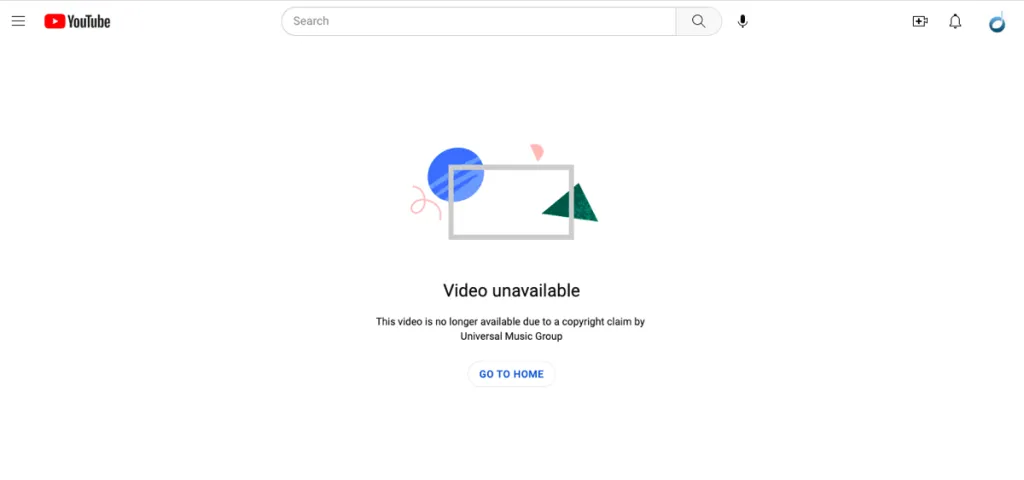All that remained of an AI-Generated Drake/The Weeknd ‘collaboration’ on Monday evening (April 17th).
A viral AI-generated ‘collaboration’ between Drake and The Weeknd was ripped down by Universal Music Group on Monday evening (April 17th)— but not before it garnered a half-a-million views on YouTube and hundreds of thousands of plays across other streaming services. It’s the latest in a string of AI concoctions to get ‘whacked’ by UMG — with potentially many more to come.
For those pontificating about the dystopian future of AI, perhaps that moment has already arrived for the music industry.
After forcing the removal of numerous AI-generated tracks on major DSPs like Spotify, Deezer, Tidal, and Apple Music, mega-major Universal Music Group is starting the process all over again. As of Monday evening (April 17th), a quickly-exploding, AI-generated ‘collaboration’ between Drake and The Weeknd, dubbed “Heart on My Sleeve,” was abruptly torn down on YouTube. The track was also scrubbed from numerous other streaming platforms on copyright infringement grounds.
For those who heard the track, the concoction was surprisingly listenable — and certainly believable for anyone who didn’t know better. ‘Ghostwriter,’ the owner of the YouTube account where the video appeared, ominously promised that ‘this is just the beginning,’ though it also looks like Ghostwriter’s account has been deleted.
The teardown comes just hours after Drake himself responded to a completely different AI-generated track that also went viral.
That would be the AI-concocted version of the artist rapping Ice Spice’s recent hit, “Munch.” It’s a deliciously comical reinterpretation — that is, unless it happens to be your voice being reinterpreted. “This is the last straw,” Drake wrote on Instagram, while pointing to his parent label UMG’s efforts to clamp down on AI-generated content on streaming services.
Incidentally, it looks like any YouTube videos using the Drake/Weeknd collaboration track are also getting taken down. But at this stage, it’s becoming difficult to keep tabs on the fast-proliferating list of AI-generated tracks. It’s even harder to keep them removed: the aforementioned Ice Spice track is still readily available on YouTube, along with a bevy of other AI-generated Drake re-imaginations.
After one track gets removed, three more get posted — a situation that sounds depressingly familiar.
Indeed, AI-generated Drake tracks are exploding, with versions spanning the believable to the absolutely absurd. The latter includes Drake covering Colbie Caillat’s “Bubbly,” complete with some equally-ridiculous cover art. Other AI-powered explorations into the ridiculous are readily available, including Kanye West covering George Micheal’s “Careless Whisper,” “Munch,” and — you get the idea.
So what happens to this cornucopia of AI-generated infringement?
For those that remember the late-90s/early-2000s, ‘whack-a-mole’ is a familiar phrase. After the death of Napster, major labels like Universal Music Group found themselves locked in an endless string of site closures and teardowns — only to find cloned imitations reappearing in a matter of days. Now, it looks like AI is stirring a similar cycle, with endless fake songs, covers, and absurdities springing up on YouTube, SoundCloud, Spotify, and other spots.
Against that onslaught, YouTube may be under pressure to AI-generate a stepped-up Content ID update. Similarly, streaming services like Spotify may find themselves applying extra scrutiny to uploads — even if that means inspecting the tens of thousands of tracks arriving on its doorstep daily.
Universal Music Group offered the following statement concerning its stepped-up enforcement against AI-generated tracks.
“Universal Music Group’s success has been due, in part, to embracing new technology and enabling it to empower our artists. We’ve been doing this with our own innovation around AI for some time. With that said, however, the training of generative AI using our artists’ music (which represents both a breach of our agreements and a violation of copyright law) as well as the availability of infringing content created with generative AI on DSPs, begs the question as to which side of history all stakeholders in the music ecosystem want to be on: the side of artists, fans and human creative expression, or on the side of deep fakes, fraud and denying artists their due compensation.
“These instances demonstrate why platforms have a fundamental legal and ethical responsibility to prevent the use of their services in ways that harm artists. We’re encouraged by the engagement of our platform partners on these issues — as they recognize they need to be part of the solution.”
It’s unclear how many total streams “Heart on My Sleeve” received, though track plays may have crossed into the low millions.
That would be enough to qualify for numerous chart positions, though the song may be quickly disqualified from the rankings.
More as this develops.

